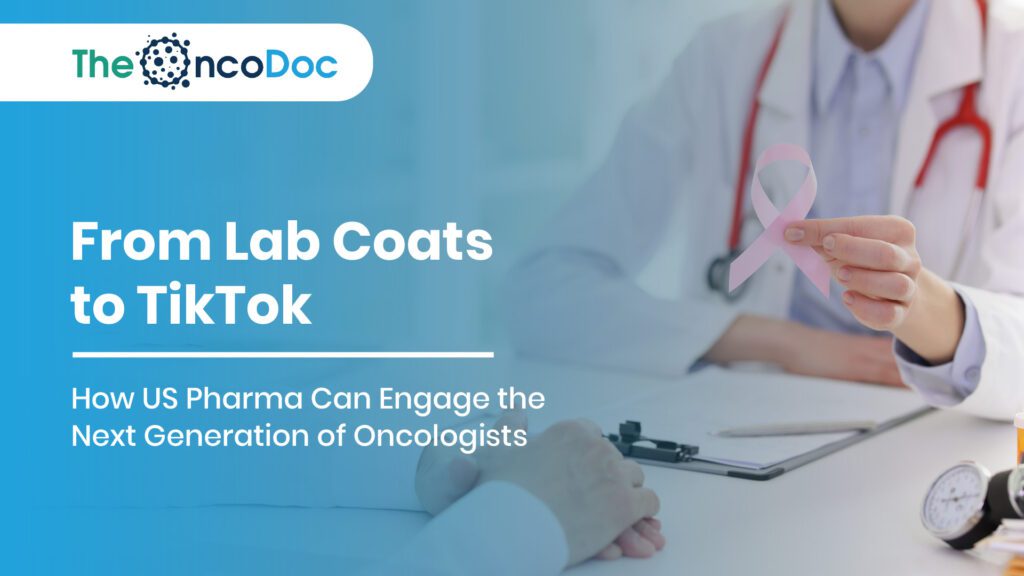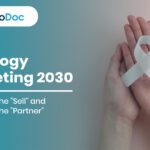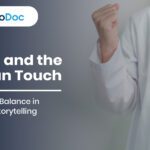Abstract
The US oncology landscape is undergoing a significant demographic shift. As the baby boomer and Generation X oncologists approach retirement, a new cohort of physicians, shaped by the digital age, is rising to the forefront: Generation Z. Born roughly between 1997 and 2012, this group of physicians and trainees, often referred to as “digital natives,” consumes information, builds trust, and makes decisions in fundamentally different ways than their predecessors. Traditional pharma marketing strategies—relying heavily on face-to-face interactions, printed materials, and formal conferences—are becoming increasingly ineffective in reaching and engaging this critical audience.
This article provides a comprehensive analysis of the unique digital behaviors and values of Gen-Z oncologists and offers a strategic playbook for pharma managers to bridge this generational gap. We will explore how AI is not just a tool, but the essential engine for powering a new era of engagement, focusing on five critical pillars: 1) Creating Authentic, Value-Driven Content; 2) Mastering the Short-Form Video Ecosystem; 3) Building Digital Communities and Peer-to-Peer Networks; 4) Leveraging AI for Hyper-Personalization Without Sacrificing Authenticity; and 5) Integrating Micro-Learning into the Clinical Workflow.
For each pillar, we will provide a deep dive into the underlying psychological drivers of Gen-Z behavior, practical digital marketing tactics, and illustrative data to highlight the urgency and opportunity of this shift. The discussion will emphasize how pharma can pivot from a transactional, product-centric approach to a more human-centered, education-focused model that aligns with Gen-Z’s values of authenticity, social responsibility, and transparent communication. By embracing this new digital frontline, pharma can secure its future by building lasting, meaningful relationships with the physicians who will shape the next few decades of cancer care.
Introduction: The Digital-First Mindset of the Next-Gen Oncologist
For decades, the foundation of pharma-HCP engagement has been the personal touch: the sales representative’s visit, the sponsored dinner meeting, the conference booth. This model was built on a foundation of trust and relationship-building that resonated with generations who valued face-to-face interaction and traditional authority. However, for a 28-year-old oncology fellow who has spent their life on platforms like YouTube, TikTok, and Instagram, this approach feels antiquated, slow, and often inauthentic.
Gen-Z oncologists, in their training and early practice, are already consuming a vast amount of their professional and personal information through digital channels. They are experts at filtering out promotional noise, are deeply wary of content that feels “salesy,” and are more likely to trust a peer-reviewed article found via a semantic search than a printed brochure. They value transparency, expect a seamless digital experience, and are drawn to content that is not only scientifically rigorous but also concise, visually compelling, and ethically grounded.
This is not just a demographic shift; it is a fundamental change in the rules of engagement. Pharma companies that fail to adapt risk becoming irrelevant to the very physicians who will be making the majority of prescribing decisions in the years to come. The challenge for pharma managers is to build a new digital front line that meets Gen-Z oncologists where they are, on their terms, and with a level of authenticity and value they have come to expect. This article will show how AI, in a strategic and nuanced way, is the key to unlocking this new era of engagement.
Pillar 1: Creating Authentic, Value-Driven Content
The Problem
Gen-Z’s defining characteristic is their deep-seated distrust of inauthenticity and corporate-speak. They are masters of detecting “health-washing”—marketing that masks a commercial agenda under the guise of public good. Traditional pharma content often feels overly branded, scripted, and detached from the real-world clinical challenges oncologists face.
The Strategic Pivot
Pharma must shift its content strategy from product promotion to genuine scientific and educational value. The goal is to become a trusted, transparent partner, not just a product vendor. This means creating unbranded or subtly branded content that addresses the real-world complexities of cancer care.
- Behind-the-Scenes and Human Stories: Instead of a clinical trial data slide deck, create a short video featuring the lead investigator discussing the passion and challenges behind the research. Gen-Z responds to the human element.
- Ethical and Social Responsibility: Content should reflect a company’s commitment to social good. Pharma brands can highlight their efforts in clinical trial diversity, health equity initiatives in underserved communities, or sustainability practices in manufacturing. This aligns with Gen-Z’s values and builds brand trust.
- Debunking Misinformation: In the age of online misinformation (e.g., on TikTok, where patients seek health advice), pharma can become a reliable source of fact-checking and evidence-based information, building credibility with a generation that cross-references everything.
The AI Enabler
AI, when used correctly, can power this shift to authenticity.
- NLP for Content Gap Analysis: AI-powered Natural Language Processing can analyze conversations on professional forums, social media (where compliant), and public research queries to identify real-time knowledge gaps and hot topics among young oncologists. This ensures content is highly relevant and addresses genuine needs, not just brand messaging.
- Generative AI for Drafts: Generative AI can assist in creating drafts of educational content (e.g., explainers, infographics, video scripts) based on approved scientific data, ensuring accuracy while freeing up medical teams to focus on strategy and nuance.
- Sentiment Analysis: AI can monitor the online response to content, providing real-time sentiment analysis to ensure messaging resonates authentically and is not perceived as overly promotional.

Pillar 2: Mastering the Short-Form Video Ecosystem
The Problem
Gen-Z’s preferred medium is short-form, vertical video (Reels, TikTok, YouTube Shorts). Their average attention span is shorter, and they expect content to be visually engaging and immediately rewarding. A 30-minute webinar, once a staple of CME, is a non-starter.
The Strategic Pivot
Pharma needs to embrace a “video-first” content strategy that is designed for mobile consumption and respects the viewer’s time.
- Micro-Learning Segments: A complex Phase 3 clinical trial can be broken down into 60-90 second “micro-learning” videos. One video might explain the trial design, another the primary endpoint, and a third a key safety finding.
- Visual Storytelling: Instead of a static data table, use animated graphics, data visualizations, and dynamic text overlays to make complex information digestible and visually appealing.
- Expert Soundbites: Feature a Key Opinion Leader (KOL) in a series of short Q&A clips addressing common clinical questions, fostering a more conversational and less formal expert exchange.
The AI Enabler
AI is the engine for this video transformation.
- Automated Content Slicing: AI can automatically analyze long-form video (e.g., a full-length CME webinar) and “slice” it into dozens of bite-sized, purpose-driven micro-clips, complete with transcripts, captions, and key tags.
- Dynamic Visuals: Generative AI can assist in creating quick-turnaround animated graphics and data visualizations that translate complex data into a visually compelling format, optimized for mobile screens.
- Recommendation Engines: AI-powered recommendation engines on pharma-owned platforms can suggest the next most relevant micro-learning video based on a Gen-Z oncologist’s viewing history, creating a personalized learning path.

Pillar 3: Building Digital Communities and Peer-to-Peer Networks
The Problem
Gen-Z places a high value on peer validation and community. They are more likely to seek advice from a trusted peer on a professional forum or a respected voice on social media than to solely rely on institutional sources. Traditional pharma engagement is often a one-way street, failing to facilitate this crucial peer-to-peer exchange.
The Strategic Pivot
Pharma must evolve from a broadcaster to a community facilitator. The goal is to provide a safe, compliant space for Gen-Z oncologists to connect, share, and learn from each other.
- Moderated Forums and Private Groups: Create a dedicated, secure digital community platform where Gen-Z oncologists can ask questions, discuss complex cases (anonymously), and share best practices. A pharma-employed medical professional can moderate the group, providing expert oversight without overt promotion.
- Live Q&A Sessions: Host informal, live Q&A sessions on professional platforms, allowing oncologists to ask unscripted questions to a KOL. This format, similar to a “Reddit AMA,” feels authentic and interactive.
- Co-Creation of Content: Invite young oncologists to co-create content, such as a video series on a specific disease state or a guide to navigating fellowship. This empowers them as experts and builds a sense of ownership and loyalty.
The AI Enabler
AI can make community management scalable and insightful.
- Intelligent Content Moderation: AI can flag potentially off-label conversations or compliance risks in a forum, alerting a human moderator. This ensures a compliant environment without a massive manual oversight effort.
- Insight Generation: NLP can analyze forum discussions to identify emerging clinical trends, unmet needs, or common questions, providing valuable, real-time market intelligence that informs future content strategy and R&D.
- Connection Algorithms: AI can suggest peer connections within the community, matching an oncologist with a specific interest (e.g., rare blood cancers) with an expert in the same field.

Pillar 4: Leveraging AI for Hyper-Personalization Without Sacrificing Authenticity
The Problem
Gen-Z expects personalization; they have grown up with streaming services and social media algorithms that deliver content tailored to their every whim. However, they are also wary of data privacy and intrusive tracking. Generic marketing feels irrelevant, but overtly data-driven, “creepy” marketing erodes trust.
The Strategic Pivot
The key is to use data to create a subtle, helpful, and anticipatory experience, not an invasive one. The personalization should feel like a brand is “getting” them, not “watching” them.
- Dynamic Content Delivery: An oncologist visiting a pharma website for a new drug might see content that dynamically adjusts based on their click history. If they clicked on a section about a specific biomarker, a related video on the latest testing methods for that biomarker should appear as a featured asset.
- Contextual Messaging: Instead of a mass email, AI can send a timely, personalized message. For example, if an oncologist attended a virtual conference session on a specific rare tumor, a brief follow-up email with a link to a related case study on the pharma’s portal would feel relevant and helpful.
- Real-Time Recommendations: On a pharma-owned platform, an AI-powered recommendation engine can provide a “For You” feed of articles, videos, and podcasts based on their recent activity and expressed interests.
The AI Enabler
AI orchestrates this sophisticated personalization.
- Predictive Analytics: AI models analyze anonymized behavioral data to predict an oncologist’s informational needs and content preferences, enabling anticipatory content delivery.
- Omnichannel Orchestration: AI serves as a central hub, ensuring that interactions across all channels (email, website, sales rep visit) are coordinated and consistent, creating a seamless, personalized journey rather than a series of disjointed touchpoints.

Pillar 5: Integrating Micro-Learning into the Clinical Workflow
The Problem
The life of a US oncologist is dictated by a demanding schedule. Asking them to take time out of their day for a separate learning activity is a major barrier. The most valuable engagement will occur when education is seamlessly integrated into their clinical workflow.
The Strategic Pivot
Pharma can use technology to deliver “learning-in-the-flow-of-work,” embedding educational resources directly where and when an oncologist needs them.
- EHR Integration (with consent): As new guidelines or drug approvals emerge, AI-powered tools can push alerts or educational summaries directly into the Electronic Health Record (EHR) system, providing just-in-time information at the point of care.
- Clinical Decision Support (CDS) Tools: Pharma can support the development of AI-powered CDS tools that provide instant access to relevant clinical data, trial results, and prescribing information for a specific patient case, with links back to more detailed educational content.
- Secure Mobile Apps: Create secure mobile apps where oncologists can access all of the micro-learning content, case studies, and community forums from a single, trusted source, accessible from their smartphone in between patient appointments.
The AI Enabler
AI makes this integration intelligent and precise.
- Contextual Content Delivery: AI can identify a specific patient case in the EHR (e.g., a patient with a specific gene mutation) and, if the oncologist has consented, offer a link to a relevant piece of educational content on that mutation, delivered at the exact moment of need.
- Performance Tracking: AI can track engagement with these integrated tools, providing anonymized data on how and when the resources are being used, which informs future content strategy.

Conclusion: From a Marketing Problem to a Relationship Opportunity
Engaging Gen-Z oncologists is not a niche marketing problem; it is a strategic imperative for the future of the pharmaceutical industry. This generation is poised to redefine patient care, and their approach to information, communication, and trust is fundamentally different. By leveraging AI to power authenticity, master short-form video, build digital communities, enable subtle personalization, and integrate learning into the clinical workflow, pharma managers can move beyond outdated marketing tactics.
The “secret” to engaging Gen-Z oncologists is to pivot from a transactional, “push” model to a human-centered, “pull” model. It’s about earning their trust by providing genuine value, respecting their time, and meeting them on their terms. This is not just about adapting to a new demographic; it is about building a more sustainable, transparent, and valuable relationship with the physicians who will lead the fight against cancer in the coming decades. The digital front line is here, and it’s time for pharma to lead the charge.
The Oncodoc team is a group of passionate healthcare and marketing professionals dedicated to delivering accurate, engaging, and impactful content. With expertise across medical research, digital strategy, and clinical communication, the team focuses on empowering healthcare professionals and patients alike. Through evidence-based insights and innovative storytelling, Hidoc aims to bridge the gap between medicine and digital engagement, promoting wellness and informed decision-making.



